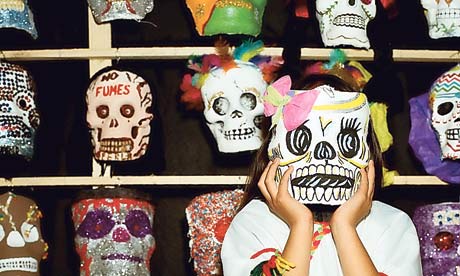
Do you see a glass that is half-full, half-empty, or that simply contains enough liquid to throw over the idiot asking you to make the choice? However you answer, Oliver Burkeman's The Antidote is like a Pimm's on a summer's day: refreshing if consumed by those already sceptical about the power of positive thinking, bracing if splashed in the face of those who aren't.
In his long-running Guardian column, Burkeman has proven himself to be a very rare beast indeed. He is never sneering or snooty about the self-help world he explores, and is always willing to grant to whoever he is examining whatever truth might lie behind their claims. At the same time, he has not allowed his brain to turn to mush.
Those same qualities are on display in The Antidote, which also allows him to go beyond the limits of the column and get almost as close as you can to a recipe for contentment while rejecting the whole idea of a wellbeing formula. Burkeman noticed that "something united all those psychologists and philosophers – and even the odd self-help guru – whose ideas seemed actually to hold water". This Burkeman calls the "negative path": the idea that the more we strive for happiness, and other psychological goods like security and confidence, the less we achieve them. And so, paradoxically, it is by thinking more about the downers in life, such as the inevitability of death, the inescapability of suffering or the impossibility of security, that we achieve something like happiness.
Burkeman is keen to emphasise that the negative path is not "one single, comprehensive, neatly packaged philosophy" and nor is it a "panacea". It is rather a family of approaches that share an interest in coming to terms with the imperfections of reality in a number of different ways.
The bulk of the book sees Burkeman walk down these paths increasingly less trodden. So, taking the advice of Stoic-inspired psychotherapist Albert Ellis, he says the names of tube stations out loud at each stop, in order to get over the feeling that it would somehow be terrible if people thought him mad. He travels to Kibera in Kenya to see just why it is that the impoverished, slum-dwelling residents still seem to be pretty happy. And he spends the Day of the Dead in a Mexican hamlet to understand better why it's good to remind yourself vividly of your mortality.
All of this provides plenty of opportunities to be pat, glib or superficial but Burkeman never takes them. For instance, in Kenya he can see that simply taking the apparent happiness of its people at face value is "laden with problems", from the racism of thinking that "primitive" people are simpler souls than westerners to the political conclusion that nothing needs to be done to alleviate their poverty. The right lesson to draw, he concludes, is that although extreme insecurity is a bad thing, it provides one huge benefit: you cannot be worried about losing your security if you don't have any to lose in the first place. And worries about becoming insecure do seem to be at the root of a lot of anxiety in western societies. See how the Daily Mail taps into the fear of a large segment of the middle class that their respectable status is vulnerable and could be taken away any minute by a government or Europe that doesn't care.
It could be argued that Burkeman does not go far enough. Even deeper than the problems caused by the pervasive ideology of positive thinking is the assumption that it makes good sense to categorise all our thoughts as positive or negative in the first place. Call me old-fashioned, but much more important than seeing positively is to see accurately, truthfully, honestly and sincerely. Although Burkeman commends truthfulness, he doesn't stress its value for its own sake, only as a surer means to happiness than rose-tinted vision.
Only at the very end does he come close to questioning happiness as the most desirable outcome. He talks about arriving at "a different definition of happiness itself", although he doesn't attempt to specify one, concluding that "these things are excruciatingly hard to put into words". What he suggests is that "a happiness worthy of the name" must include a mix of the rough and smooth, the aches and pains as well as the joys of life.
Maybe it would be better to jettison the H word altogether. Even the father of positive psychology, Martin Seligman, has pretty much abandoned it, preferring instead to talk about flourishing, the thing that Aristotle saw as the highest human good. When we flourish, we do often feel happy, but that's simply an effect of the real goal, which is to live in accordance with our natures, doing the things we do best the best we can do them. Rather than seeing this as the indirect route to happiness, we should see it as the direct route to what it actually is. Happiness is neither the journey nor the destination, it's simply something we get more than enough of when we travel the right way.
Burkeman would be the first to accept that he hasn't written the last word on human happiness. But he has written some of the most truthful and useful words on it to be published in recent years. The knowledge Burkeman draws on may well come from others, but the book's quiet wisdom is all his own. This is a marvellous synthesis of good sense, which would make a bracing detox for the self-help junkie.
• Julian Baggini's The Ego Trick is published by Granta.
• Download the audiobook at audible.co.uk.

